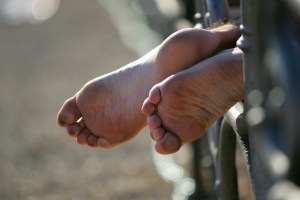“Will it ever arrive?”
“I’m sick of waiting!”
“Is this ever going to end?!”
You know how agonizing it feels to wait for the train.
The 2020-2021 edition of the waiting game is getting old for everyone. We all feel it on multiple fronts. There are still rampant COVID diagnoses and grieving. So many people are awaiting vaccination. Hosts of friends and family are hoping to return to the workplace, struggling to help kids with school at home, praying for a new job, and a host of other issues. Lots of precious folks are struggling to cope and find themselves swept into old addictions.
So many of us are struggling as we approach the one-year mark. I chuckle when I recall how we all thought that everything would surely be back-to-normal by Easter—last year.
The Apostle Paul expressed similar frustration in his letter to the Romans, chapter 8. The oft-quoted, oh-so-famous, standout is verse 28:
“And we know that in all things God works for the good of those who love him, who have been called according to his purpose.”
You’re probably saying, “Yea, okay, I saw that at Hobby Lobby on bric-a-brac. So? Big deal!”
It’s comforting indeed, reassuring for sure, that God is working in all things. Even in our agonizing and waiting. That brings us renewed confidence. But because biblical context is vital for greater clarity of understanding and accurately creative application, we do well to look at what’s around these beloved lines. Right before this, Paul employs dismal words like:
Suffering
Waiting
Expectation
Frustration
Subjected
Bondage
Decay
Groaning
Weakness
He utilizes these terms in both micro and macro ways, descriptive of both our personal attitudes and in the larger cosmos, all of creation.
But he also shares bright words like:
Glory
Eager
Hope
Freedom
Spirit
Adoption
Redemption
Help
Pray
And Christ’s Spirit intercedes for us.
Paul’s upside verbiage feels intentionally stronger. We can sense it! He is hopeful and anticipatory. But it’s not mere sentiments of sunshine or some short-term, rosy change of circumstances. For Paul, reflection runs much deeper and far-reaching. With vs. 29-30, Paul actually describes the good work.
“For those God foreknew he also predestined to be conformed to the image of his Son, that he might be the firstborn among many brothers and sisters. And those he predestined, he also called; those he called, he also justified; those he justified, he also glorified.”
There’s some serious upside, seriously divine work! Note, God’s impressive foreknowledge and predestination. These are rich concepts reinforcing vital truth that he powerfully knows and plans. He is sovereign; he’s seriously in control. In Romans, Paul is emphasizing the gracious good news, the Gospel of God’s salvation, his righteousness for us in Christ Jesus. We can assuredly trust him. Even with all the evil happenings and sinful people, his good purpose will not be thwarted. Take that to the bank. He is sovereign. We can trust him.
But what is his good purpose? That we will be conformed to the image of his Son and there will be more brothers and sisters. More family!
What’s that about? It’s our re-creation. Recall how in Genesis 1, we saw the very good creation of humans “in God’s image.” But in Genesis 3, the fall into sin happens—the insurrection against the loving King—and so the image of God was marred, mangled, fallen because of sin. The creation was subjected to frustration, starting right here.
But God, in his love and grace commenced his salvation and redemption plans, to bring King Jesus, our Savior, our Redeemer. He is the firstborn (an old way of saying “first in rank, supreme, the preeminent one”). And notice: “among many brothers and sisters!”
Here’s the amazing deal. By the Father’s good plans and gracious purposes, we get conformed to Jesus’ image, re-made in the image of our Creator. Paul was also declaring that this redemptive work positively affects all creation. And the overflow of God’s good work is that more and more people in turn become his children. It’s stunning good work that he accomplishes. Jesus’ life, love, and work flow through our lives, love, and work, and even more brothers and sisters are conformed to the image of Christ!
It’s really moving to realize the real scope of Romans 8. Just like that original good and blessed intention back at Creation (Genesis 1), our salvation and gracious recreation into Jesus’ image leads to us doing good. Really. We do good works. Others are blessed and join his family!
What train are you waiting for right now? Are you weary? Frustrated? You are not alone!
Think on Paul’s bigger view of how God is working, why he’s working, and what he is bringing to fruition. Even amidst all the waiting and weariness, you can take heart. Be encouraged. He is working so much good, so that each of us looks more like Jesus, so that more people join his family!
Nothing is wasted in God’s workshop. He’s working in our waiting, even when it feels so frustrating.
Even when we can’t see it, he is still working. Especially amidst ugly pandemics, nasty politics, struggling economies, so much groaning and grieving. We can trust him. Think anew! Because of Jesus, you are called. You are justified. And based on his precious promises, he is working his plans for greater glory.
We are all still waiting, still weary, but full of hopeful expectation!

